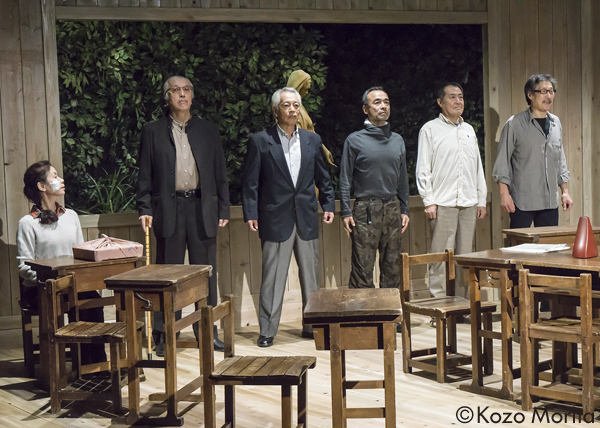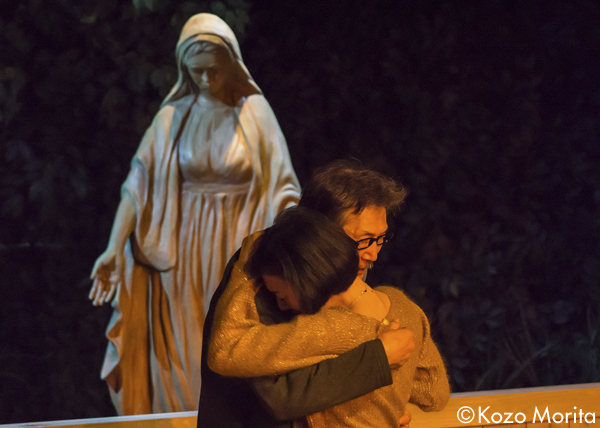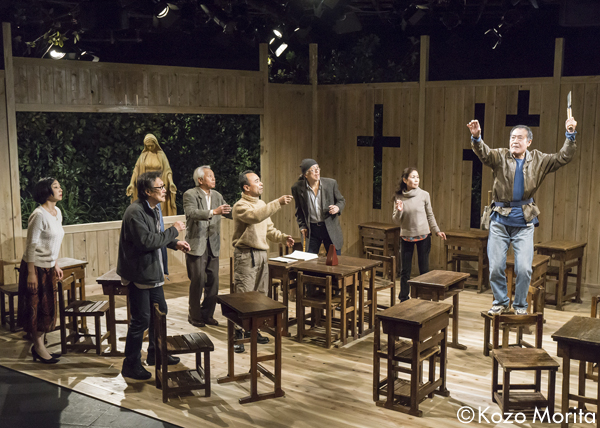The setting is summer, several years in the future. In the village of Sasayaki-dani in the town of Sasagoe-machi deep in the mountains there is a now abandoned former middle school building.
Outside the window a wooden statue of the Mother Mary can be seen. A man named Matsuda about 70 years of age appears. Looking despondent, he complains to the statue of Mother Mary, “I was in my teens, then I woke up and suddenly I was an old man.” Classmates Miyamoto and Ebisu appear and realize that Matsuda’s advancing dementia has thrown him into a state of confusion.
While many of their classmates had left the village after graduating, these three had stayed on to work in the local forestry industry, and they had formed a male chorus. The night before had been the Buddhist ceremony commemorating the 49th day since the death of their chorus leader, however, and now the chorus was down to just three of them.
As the three carry on a chorus meeting, another of their former classmates, a woman named Chizuko sits apart watching. Their now closed former school and surrounding properties are being bought up to construct a facility for the elderly, and although there is a group in the town that opposed the project, Chizuko was one of the first to sell her land. As a result, there is an unpleasant air between the four sitting across the room from each other. Matsuda’s son Mikio adds to the tension by saying that the contractors have begun construction and the school is already a closed-off zone.
The scene shifts to an afternoon in autumn. Kana, the daughter of the deceased former leader of the chorus, Inoue, is now an employee of the facility for the elderly and is showing the perspective new residents Kitano and Hosono around the facility. She shows them a classroom that will be used as a workroom for residents to learn woodcraft. Kana is worried because one of the prospective residents who was supposed to join this tour of the facility can’t be contacted.
Then, the three chorus members appear and, ignoring Kana and the two others, begin a meeting to plan for their coming Christmas concert. It turns out that the chorus members are former classmates of Kitano and Hosono as well. The five begin talking about old times and especially about Ayumi Sawada, who was the prettiest and most popular girl in their class.
Rain has started to fall and once again Chizuko is looking in at the classroom. Miyamoto invites Kitano and Hosono to join their chorus, and he also suggests to Chizuko that she become the chorus’ manager. Suddenly a woman comes in, drenched by the rain. It is Ayumi, who happened to be the third prospective resident who was late for the tour of the facility. Instantly, Ayumi becomes the center of attention for the men. An irritated Chizuko starts pressing Ayumi about the reason she decided to come back to the village. Ayumi mutters, “I was looking for a place to die.”
It is now an autumn evening. Kana and Mikio are struggling to move the statue of Mother Mary. The statue has long been a symbol of the village and they are trying to do their part to preserve it. Kana, who has worked at a home for the elderly before, says there seems to be a disquieting emotion at work among the chorus members and is worried that it will lead to a bad situation.
Late autumn. The chorus members are trying to decide who will sing which parts. They all want the lead vocal part and won’t give in; it is nearing a fight. Then Matsuda appears with a chopper in his hand, his dementia progressing, he begins to fight some unseen enemy before giving up and returning to his son’s place.
A night in early winter. Miyamoto is looking through a musical score. Matsuda appears, looking as if he has returned to his youth and begins talking on and on about Miyamoto’s lover from long ago, Kyoko. Matsuda is convinced that it was his fault that the two separated.
In the evening of the next day, there is a meeting to decide on the songs to be performed. Kana is there to assist Kitano, who is not feeling well, and Matsuda has his son Mikio carrying the sheet music and enters along with Ebisu. Ebisu admonishes Kana for having sold the grove of thousand-year-old cryptomeria trees that have long been a proud symbol of Sasayaki-dani. She counters, citing the growing need for care-giving for the elderly, who will eventually be given a tree-planting burial in the cryptomeria grove.
Those who return to the village will return to its soil after their death. For those who left the village in the youth and are now returning, the facility for the elderly represents an ideal place to live out the remainder of their lives, but for those who stayed to live their lives here, it is no more than a symbol of the forces that are changing their home. Caught between the two sides, the frustrated Kana grabs the pile of sheet music and throws it to scatter on the floor.
After everyone leaves, Miyamoto and Ayumi pick up the music off the floor and put it back in order. The handkerchief that Miyamoto unwittingly hands to Ayumi is a black one of the kind used at funerals. It is the very one she had lent him when they were in their twenties and she had returned to the village for her father’s funeral. That one return visit by Ayumi had been the cause of the breakup between Miyamoto and his lover Kyoko. Miyamoto pushes Ayumi to the floor. Struggling free of his grasp, Ayumi continues picking up the sheet music on the floor.
It’s December. Kitano is smoking a cigarette at the spot where the statue of the Mother Mary used to stand. Chizuko approaches Kitano, and he invites her to go on a trip overseas together. Chizuko talks about seeing the movie “Sound of Music” when she was 16 and the longing it stirred in her. The two walk away as if setting out on a journey.
Christmas approaches. Kana and Mikio are cleaning up a classroom. The renovation of the building is finally about to begin. Kana mumbles, “I wonder what it is like to see a town disappear?”
Then Miyamoto enters slowly dressed in formal attire. He is followed by Ebisu and Hosono, and Ayumi in a dress. Each is wearing a costume made by Ayumi. Kitano and Chizuko join them, and when they all line up in their black formal wear they look like a members of a funeral procession. Matsuda is the only one missing.
The men line up desks to make a stage. Before long Kana and the others begin to help. In the distance is the sound of thunder.
As the men climb up on the desks and are about to being singing, Ayumi says, “I see smoke coming from the grove of Building No. 1.” Ayumi gazes at the fire that none of the others can see.
Matsuda appears in the doorway and goes to the conductor’s position. Appeasing Ayumi who is screaming about the approaching fire, Matsuda raises a finger. Just as the men open their mouths to sing out the first notes, the stage goes dark.
In the dark, the song “My Favorite Things” is heard.





